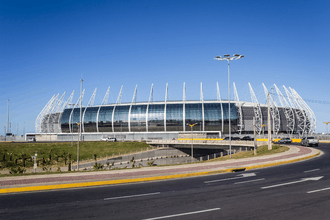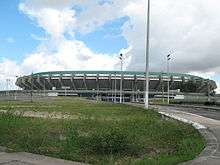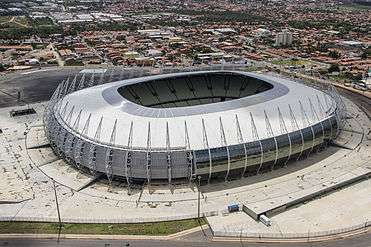Castelão (Ceará)
| "Gigante da Boa Vista" | |
 | |
| Full name | Estádio Governador Plácido Castelo |
|---|---|
| Location | Fortaleza, Ceará, Brazil |
| Coordinates | 3°48′26″S 38°31′21″W / 3.80722°S 38.52250°WCoordinates: 3°48′26″S 38°31′21″W / 3.80722°S 38.52250°W |
| Owner | State of Ceará |
| Operator | State of Ceará |
| Capacity | 63,903[1] |
| Record attendance | 118,496 |
| Field size | 105 x 68 m |
| Surface | Grass |
| Construction | |
| Broke ground | 1969 |
| Built | 1969–1973 |
| Opened | November 11, 1973[2] |
| Renovated | 2002 and 2012 |
| Expanded | 1980 |
| Architect |
José Liberal de Castro Gehard Ernst Borman Reginaldo Mendes Rangel Marcílio Dias de Luna Ivan da Silva Britto |
| Structural engineer | Hugo Alcântara Mota |
| Tenants | |
|
Fortaleza 2014 FIFA World Cup | |
The Estádio Governador Plácido Castelo, also known as the Castelão (Portuguese pronunciation: [kasteˈlɐ̃w], Portuguese for "Big Castle") or Gigante da Boa Vista, is a football stadium that was inaugurated on November 11, 1973 in Fortaleza, Ceará, Brazil, with a maximum capacity of 63,903 spectators. The stadium is owned by the Ceará state Government, and is the home ground of Ceará Sporting Club and Fortaleza Esporte Clube. Its formal name honors Plácido Aderaldo Castelo, who served as the Governor of Ceará from September 12, 1966 to March 15, 1971, and was a leader in getting the stadium built.[3]
History
Castelão was constructed from 1969 to 1973 and was inaugurated on November 11 of that year.
In May 2000, the Ceará state government started to reform the stadium. The reformations were divided in three stages, and started on May 16, 2001. The first stage consisted in the recovery of the ditches, and of the bleachers junctions, as well as the recovery of the low walls. The second stage of the reformation started on July 20, 2001, and consisted in the recovery and strengthening of the stadium's physical structure. The third stage consisted in the recovery of the electrical, hydraulic, sanitary, and electronic installations.[3]
The inaugural match was played on November 11, 1973, when Ceará and Fortaleza drew 0-0. The stadium's first goal was scored on November 18, 1973 by Ceará's Erandy, when Ceará beat Vitória 1-0.[4]
The re-inaugural match was played on March 23, 2002, when the Brazil national team beat the Yugoslavia national team 1-0.[3] The stadium's first goal after the re-inauguration was scored by Brazil's Luizão.[3] The stadium's attendance record currently stands at 118,496, set on August 27. 1980, when the Brazil national team beat the Uruguay national team 1-0.[4]
2013 FIFA Confederations Cup
| Date | Time (UTC-03) | Team #1 | Res. | Team #2 | Round | Attendance |
|---|---|---|---|---|---|---|
| June 19, 2013 | 16:00 | 2–0 | Group A | 57,804 | ||
| June 23, 2013 | 16:00 | 0–3 | Group B | 51,263 | ||
| June 27, 2013 | 16:00 | 0–0 a.e.t.(Penalties: 7–6) | Semi-Final | 56,083 |
2014 FIFA World Cup
Castelão was one of the venues of the 2014 FIFA World Cup, which took place in Brazil. The stadium was redeveloped for the tournament; the reconstruction project, by Uruguayan architect Héctor Vigliecca, involved the addition of a larger roof, the construction of an underground car park with 4,200 spaces, and a new lower tier. After the redevelopment, the stadium now has an all-seater capacity of 67,037. The stadium closed on March 31, 2011 for the reconstruction project, which was officially completed in December 2012.[5] Castelão was the first of 12 stadiums being built or redeveloped for the 2014 World Cup to be completed.[5]
| Date | Time (UTC-03) | Team #1 | Res. | Team #2 | Round | Attendance |
|---|---|---|---|---|---|---|
| June 14, 2014 | 16:00 | 1–3 | Group D | 58,679 | ||
| June 17, 2014 | 16:00 | 0–0 | Group A | 60,342 | ||
| June 21, 2014 | 16:00 | 2–2 | Group G | 59,621 | ||
| June 24, 2014 | 17:00 | 2–1 | Group C | 59,095 | ||
| June 29, 2014 | 13:00 | 2–1 | Round of 16 | 58,817 | ||
| July 4, 2014 | 17:00 | 2–1 | Quarter-finals | 60,342 |
Other events
On July 9, 1980, it was opened in Fortaleza the 10th National Eucharistic Congress. Pope John Paul II participated in the celebrations of the Congress and the Estádio Castelão received the largest public of its history: 120,000 followers. On this occasion, during Virgílio Távora's government, the stadium was reformed, and the bleachers of the inferior section were concluded.
Another religious celebration happened on August 13, 1995. On this occasion the archbishop of Fortaleza Dom Aloísio Lorscheider farewell gathered 50 thousand followers.
Several artistic shows were made at the stadium. One of the most outstanding happened on December 10, 1996 when Xuxa commanded the animation to thousands of children.
FESTIVAL OF HOPE 2015- Arena Castelão. After the visit of pontiff juice, the "holy pope of the Catholic Church" is the largest event held in the stadium "Castellan" Placido Castelo, after 35 years the largest Christian event held in Fortaleza-Ceara Stadium, evangelistic group now led by evangelist evangelical; Franklin Graham, held the biggest event of evangelical Christian churches in Fortaleza, in the new arena, renovated for the games "World Cup Brazil 2015," the event brought together in three days about 130 thousand people, and offered concerts of Michael W. Shimit and Denis Agajanian, besides the message of hope Fraklin Graham, the event is called: Hope Festival, and has toured in 185 countries of the world, including TV broadcasts and achievements in stages as the fortress. Franklin Graham is the son of evangelical leader best known and most popular of the twentieth century; Billy Graham, who in 1974 held in one day during an event at the Maracana stadium (Brazil-Rio de Janeiro) a meeting for more than 220 thousand people. The event held by the evangelical churches of Fortaleza in partnership with the Billy Graham Evangelistic Association, the organizer of organ festivals held by members of the Graham family, gathered in three days more than 125,000 people and had spectacles of young children who performed dances and Typical animations and recpções the country in the beautiful stadium Placido Castelo, this time of the Franklin Graham Festival was led by the team of evangelical local movement leaders as: Thiago Pinheiro (Pastor of the Evangelical Church of Fortaleza), Vinicius Coelho (General Leader of Christian Unity Youth-Brazil), Jeter Rodrigues (Leader of the youth movement of children of pastors of the Churches Assemblies of God of Fortaleza Ceara), Fabiano Rocha (Pastor of the Evangelical Church in Fortaleza), Jeovane Silva (youth group leader of evangelical church Fortaleza), Alexandre Barbosa (Missionary of JOCUM evangelistic movement), among other leaders. And renowned pastors of the city of Fortaleza that presidenciaram the event as; Pastor Francisco Paixão (President of evangelical ministers ORDER OF THE CEARÁ- Brazil), Pastor Sandro Fiuza (pastor of the Evangelical Church CEVA-Fortaleza) and Pastor Solomon Liberato (pastor of the Evangelical Church of Fortaleza.)
Concerts

| Band/artist | Tour | Attendance | Year | Date |
|---|---|---|---|---|
| Iron Maiden | The Book of Souls World Tour | 26,000 | 2016 | March 24 |
| Franklin Graham | Festival Of Hope BGEA | 50,000 | 2015 | October 24 |
| Franklin Graham | Festival Of Hope BGEA | 45,000 | 2015 | October 23 |
| Franklin Graham | Festival Of Hope BGEA | 38,000 | 2015 | October 22 |
| Elton John | The Diving Board Tour | 18,979 | 2014 | February 23 |
| Beyoncé | The Mrs. Carter Show World Tour | 27,847 | 2013 | September 8 |
| Paul McCartney | Out There! Tour | 48,668 | 2013 | May 9 |
| Xuxa | Sexto Sentido: O Xou | 45,000 | 1996 | December 10 |
| Mamonas Assassinas | Mamonas Assassinas Tour | 37,000 | 1995 | December 22 |
| Menudos | Menudos Live 1985 Tour | 70,000 | 1985 | |
Galery
- Castelão Stadium
.jpg)
.jpg)
.jpg)
.jpg)
.jpg)
.jpg)

References
- ↑ "CNEF - Cadastro Nacional de Estádios de Futebol" (PDF) (in Portuguese). January 18, 2016. Retrieved June 6, 2016.
- ↑ http://www.worldofstadiums.com/south-america/brazil/estadio-governador-placido-castelo/
- 1 2 3 4 Enciclopédia do Futebol Brasileiro Lance Volume 2. Rio de Janeiro: Aretê Editorial S/A. 2001. pp. 457–458. ISBN 85-88651-01-7.
- 1 2 "Castelão" (in Portuguese). Templos do Futebol. Archived from the original on June 23, 2008. Retrieved 2008-09-13.
- 1 2 "Brazil opens first World Cup 2014 stadium". BBC News. BBC. December 17, 2012. Retrieved December 31, 2012.